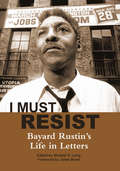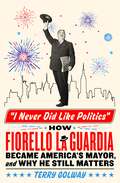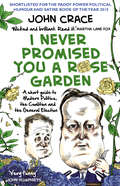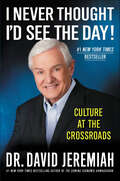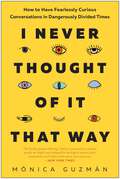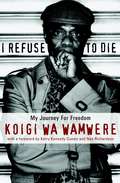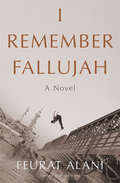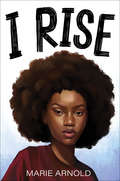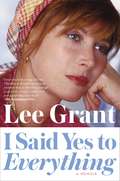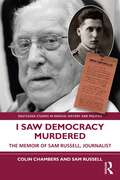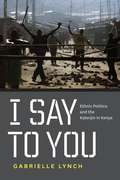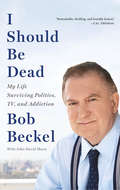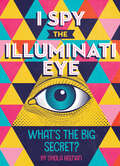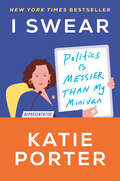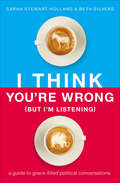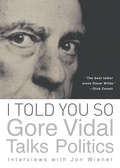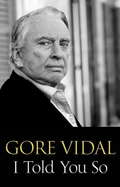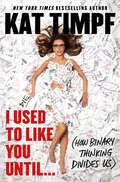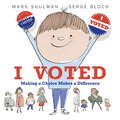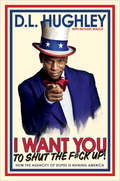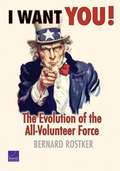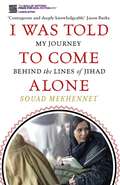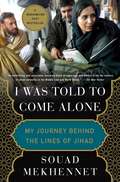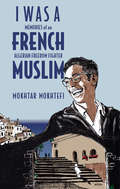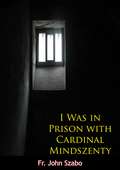- Table View
- List View
I Must Resist: Bayard Rustin's Life in Letters
by Julian Bond Michael G. Long Bayard RustinPublished on the centennial of his birth, and in anticipation of the 50th anniversary of the historic March on Washington, here is Bayard Rustin's life story told in his own words.<P> Bayard Rustin has been called the "lost prophet" of the civil rights movement. A master strategist and tireless activist, he is best remembered as the organizer of the 1963 March on Washington, one of the largest nonviolent protests ever held in the U.S. He brought Gandhi's protest techniques to the American civil rights movement and played a deeply influential role in the life of Martin Luther King, Jr., helping to mold him into an international symbol of nonviolence.<P> Despite these achievements, Rustin often remained in the background. He was silenced, threatened, arrested, beaten, imprisoned and fired from important leadership positions, largely because he was an openly gay man in a fiercely homophobic era.<P> Here we have Rustin in his own words in a collection of over 150 of his letters; his correspondents include the major progressives of his day -- for example, Eleanor Holmes Norton, A. Philip Randolph, Roy Wilkins, Ella Baker, and of course, Martin Luther King, Jr.Bayard Rustin's eloquent, impassioned voice, his ability to chart the path "from protest to politics," is both timely and deeply informative. As the Occupy movement ushers America into a pivotal election year, and as politicians and citizens re-assess their goals and strategies, these letters provide direct access to the strategic thinking and tactical planning that led to the successes of one of America's most transformative and historic social movements.
I Never Did Like Politics: How Fiorello La Guardia Became America's Mayor, and Why He Still Matters
by Terry Golway"In our current dismal passage of American politics, it’s exhilarating to read about a politician who exemplified all the qualities—courage, honesty, vision, energy, disdain for hypocrisy, concern for the downtrodden—that we were taught to revere....Remarkable." —Wall Street JournalFiorello LaGuardia was one of the twentieth century’s most colorful politicians—on the New York and national stage. He was also quintessentially American: the son of Italian immigrants, who rose in society through sheer will and chutzpah. Almost one hundred years later, America is once again grappling with issues that would have been familiar to the Little Flower, as he was affectionately known. It’s time to bring back LaGuardia, argues historian and journalist Terry Golway, to remind us all what an effective municipal officer (as he preferred to call himself) can achieve...Golway examines LaGuardia’s extraordinary career through four essential qualities: As a patriot, a dissenter, a leader, and a statesman. He needed them all when he stood against the nativism, religious and racial bigotry, and reactionary economic policies of the 1920s, and again when he faced the realities of Depression-era New York and the rise of fascism at home and abroad in the 1930s. Just before World War II, the Roosevelt administration formally apologized to the Nazis when LaGuardia referred to Hitler as a “brown-shirted fanatic.”There was nobody quite like Fiorello LaGuardia. In this immensely readable book, as entertaining as the man himself, Terry Golway captures the enduring appeal of one of America’s greatest leaders.
I Never Promised You a Rose Garden: A Short Guide to Modern Politics, the Coalition and the General Election
by John CraceExactly a week after the general election, two men – ‘Call me Dave’ and ‘Call me Nick’ – walked side by side into the rose garden of No. 10 Downing Street to give their first press-conference as Prime Minister and Deputy Prime Minister, looking for all the world like men in love. It was a romance in which people wanted to believe. But it was also one that people couldn't help but mistrust. Most unnerving, however, was the sense that they both couldn't quite believe their luck. Cameron: I can't believe it. All those people out there just for us ...Clegg: I know. It's mad, isn't it? I have to keep pinching myself as well.Cameron: Go on say it again ...Clegg: What?Cameron: Call me Prime Minister ...The storms the Dave and Nick partnership would have to face (same sex marriage, plebgate, triple dip recession, riots ...) were then unclear. Now, almost five years on, this up-to-the-minute portrait of Westminster and the forthcoming General Election exposes the realities of the Coalition, while offering an indispensible guide to a half-decade of madness:· * Foreign Policy - The new 'special relationship' - William Hague and Angelina Jolie· * The Economy - Osborne finally cracks it: boom in London; bust everywhere else.· * Immigration - should the entire population of Bulgaria pick strawberries for us?· * The Opposition - how Labour got the wrong Miliband. Includes:* UKIP, PPI, ISIS and other dubious acronyms.· * The countdown to the General Election 2015: five years of planning since the last one.Insightful, painful, very funny, this is a must-read for all of us with a vote, whichever side we thought we were on.
I Never Thought I'd See the Day!: Culture at the Crossroads
by David JeremiahIs Western civilization in an accelerating decline? And if it continues will it eventually weaken and cause us to come to the end of cultured civilization as we now know it? "Yes," says David Jeremiah, and in his book, I Never Thought I'd See the Day! he details numerous signs of this cultural decay including: America held hostage by Iran Marriage becoming obsolete Creeping socialism The invisibility of culture's enemies Increase in "spiritual warfare" America turning its back on Israel Atheist attack on religionCan this downward spiral be reversed? Yes, but only if one person at a time returns to God with our heart, our manner of life, our dedication to genuine worship of God, in serving God by helping others, in our giving, and in prayer.
I Never Thought of It That Way: How to Have Fearlessly Curious Conversations in Dangerously Divided Times
by Mónica GuzmánPORCHLIGHT BOOKS JUNE 2022 NONFICTION BESTSELLER "Assigned reading for fractured families aspiring to a harmonious Thanksgiving dinner." —New York Times "Anyone who sincerely wants to bridge the gaps in understanding will appreciate this book." —Manhattan Book Review Learn how to bring curiosity and courage to even the most difficult conversations across America&’s polarized political divide with these actionable tools for navigating challenging disagreements. Journalist Mónica Guzmán is the loving liberal daughter of Mexican immigrants who voted—twice—for Donald Trump. When the country could no longer see straight across the political divide, Mónica set out to find what was blinding us and discovered the most eye-opening tool we&’re not using: our own built-in curiosity. Partisanship is up, trust is down, and our social media feeds make us sure we&’re right and everyone else is ignorant (or worse). But avoiding one another is hurting our relationships and our society. In this timely, personal guide, Mónica, the chief storyteller for the national cross-partisan depolarization organization Braver Angels, takes you to the real front lines of a crisis that threatens to grind America to a halt—broken conversations among confounded people. She shows you how to overcome the fear and certainty that surround us to finally do what only seems impossible: understand and even learn from people in your life whose whole worldview is different from or even opposed to yours. Drawing from cross-partisan conversations she&’s had, organized, or witnessed everywhere from the echo chambers on social media to the wheat fields in Oregon to raw, unfiltered fights with her own family on election night, Mónica shows how you can put your natural sense of wonder to work for you immediately, finding the answers you need by talking with people—rather than about them—and asking the questions you want, curiously. In these pages, you&’ll learn: How to ask what you really want to know (even if you&’re afraid to) How to grow smarter from even the most tense interactions, online or off How to cross boundaries and find common ground—with anyone Whether you&’re left, right, center, or not a fan of labels: If you&’re ready to fight back against the confusion, heartbreak, and madness of our dangerously divided times—in your own life, at least—Mónica&’s got the tools and fresh, surprising insights to prove that seeing where people are coming from isn&’t just possible. It&’s easier than you think.
I Refuse to Die: My Journey For Freedom
by Kerry Kennedy Nan Richardson Koigi Wa WamwereAn extraordinary account of how a laborer's son rose to challenge the power of despots, I Refuse to Die is both the autobiography of one gifted man who rose above the horrors of colonization, and an uncensored history of modern Kenya. The book is infused with the freedom songs of the Kenyan people, as well as dream prophecy and folk tales that are part of Kenya's rich storytelling tradition. Tracing the roots of the Mau Mau rebellion, wa Wamwere follows the evolution and degeneration of Jomo Kenyatta and the rise of Daniel arap Moi.In 1979, wa Wamwere won a seat in the parliament, where he represented the economically depressed Nakuru district for three years. An outspoken activist and journalist, wa Wamwere was framed and detained on three separate instances, spending thirteen years in prison, where he was tortured but not broken. His mother and others led a hunger strike to free him and fellow political prisoners. Their efforts brought about a show trial at which Koigi was sentenced to four more years in prison and "six strokes of the cane," and escaped Kenya--and probably execution--only through the exertions of human rights groups and the government of Norway.
I Remember Fallujah: A Novel
by Feurat AlaniIn this poignant first novel of memory, identity, and generational trauma, a child of political refugees tries to uncover the past his dying father kept secret, painting a powerful, layered portrait of Iraq from the 1950s to the 2000s.As a young man in the early 1970s, Rami fled his home to escape Saddam Hussein&’s dictatorship. In France, he built a new life and had a family, working hard to become a successful immigrant. He barely speaks of his time over there, and his son, Euphrates, feels it like a wall between them. When the now elderly Rami is hospitalized with a fatal cancer, Euphrates sees his last chance to learn more about this enigmatic man, and himself.Shifting between past and present, I Remember Fallujah brings to vivid life Rami&’s coming-of-age in a land devastated by violent conflict. His memories of the city, which became a stronghold for Hussein&’s Ba&’ath Party, reveal the courageous acts of resistance, as well as complex loyalties, of left-wing Iraqis fighting against a brutal Arab nationalist movement. And where Rami&’s amnesia has erased his exile, Euphrates seeks to fill in the gaps, with memories of his childhood in Paris, and visits to a changed Iraq that will unearth key facts.Inspired by Feurat Alani&’s own history, this unforgettable first novel is a moving tribute to the love between father and son that explores the nuances of the immigrant dream, and how we live with the family and country into which we were born.
I Rise
by Marie ArnoldA heartbreaking and powerful novel about racism and social justice as fourteen-year-old Ayo has to decide whether to take on her mother's activist role when her mom is shot by police. As she tries to find answers, Ayo looks to the wisdom of her ancestors and her Harlem community for guidance.Ayo's mother founded the biggest civil rights movement to hit New York City in decades. It’s called ‘See Us’ and it tackles police brutality and racial profiling in Harlem. Ayo has spent her entire life being an activist and now, she wants out. She wants to get her first real kiss, have a boyfriend, and just be a normal teen.When her mom is put into a coma after a riot breaks out between protesters and police, protestors want Ayo to become the face of See Us and fight for justice for her mother who can no longer fight for herself. While she deals with her grief and anger, Ayo must also discover if she has the strength to take over where her mother left off.This impactful and unforgettable novel takes on the important issues of inequality, systemic racism, police violence, and social justice.
I Said Yes to Everything
by Lee GrantBorn Lyova Haskell Rosenthal in New York City, actress Lee Grant spent her youth accumulating more experiences than most people have in a lifetime: from student at the famed Neighborhood Playhouse to member of the legendary Actors Studio; from celebrated Broadway star to Vogue "It Girl." At age twenty-four, she was nominated for an Academy Award for Detective Story, and a year later found herself married and a mother for the first time, her career on the rise. And then she lost it all. Her name landed on the Hollywood blacklist, her offers for film and television roles ground to a halt, and her marriage fell apart. Finding reserves of strength she didn't know she had, Grant took action against anti-Communist witch hunts in the arts. She threw herself into work, accepting every theater or teaching job that came her way. She met a man ten years her junior and began a wild, liberating fling that she never expected would last a lifetime. And after twelve years of fighting the blacklist, she was finally exonerated. With courage and style, Grant rebuilt her life on her own terms: first stop, a starring role on Peyton Place, and then leads in Valley of the Dolls, In the Heat of the Night, and Shampoo, for which she won her first Oscar. Set amid the New York theater scene of the fifties and the star-studded parties of Malibu in the seventies, I Said Yes to Everything evokes a world of political passion and movie-star glamour. Grant tells endlessly delightful tales of costars and friends such as Warren Beatty, Elizabeth Taylor, Grace Kelly, and Sidney Poitier, and writes with the verve and candor befitting such a seductive and beloved star.
I Saw Democracy Murdered: The Memoir of Sam Russell, Journalist (Routledge Studies in Radical History and Politics)
by Colin Chambers Sam RussellI Saw Democracy Murdered is the memoir of Sam Russell (1915–2010), a communist journalist and a British volunteer with the anti-fascist Republican forces in the Spanish Civil War. The book covers his experiences during the Spanish Civil War, his time as a journalist at The Daily Worker and The Morning Star newspapers, and his later disillusionment with Stalinism. In his capacity as a journalist, Russell travelled extensively and was frequently a front-row spectator at significant historical events, from the formerly occupied Channel Islands at the end of World War II to the show trials of communists in Eastern Europe in the 1950s. His report as Moscow correspondent on Nikita Khruschev’s ‘secret speech’ condemning the crimes of Stalinism was lacerated by his newspaper's editor, as was his interview with the legendary revolutionary leader, Che Guevara. Sam, whose friends included Donald Maclean, the British diplomat who spied for the Soviet Union during the Cold War, also reported from Budapest in 1956 and Prague in 1968 during the Warsaw Pact invasions of Hungary and Czechoslovakia, and from North Vietnam during the Vietnam War, and in 1973 he witnessed the assault on Chilean President Salvador Allende's palace that signalled the start of the CIA-backed military coup. Sam’s story was told to Colin Chambers and Chris Myant and has been edited by Colin Chambers. This autobiographical account of a fascinating life will be essential reading for scholars and activists with an interest in the Spanish Civil War, the history of communism, and British radical history.
I Say to You: Ethnic Politics and the Kalenjin in Kenya
by Gabrielle LynchIn 2007 a disputed election in Kenya erupted into a two-month political crisis that led to the deaths of more than a thousand people and the displacement of almost seven hundred thousand. Much of the violence fell along ethnic lines, the principal perpetrators of which were the Kalenjin, who lashed out at other communities in the Rift Valley. What makes this episode remarkable compared to many other instances of ethnic violence is that the Kalenjin community is a recent construct: the group has only existed since the mid-twentieth century. Drawing on rich archival research and vivid oral testimony, I Say to You is a timely analysis of the creation, development, political relevance, and popular appeal of the Kalenjin identity as well as its violent potential. Uncovering the Kalenjin’s roots, Gabrielle Lynch examines the ways in which ethnic groups are socially constructed and renegotiated over time. She demonstrates how historical narratives of collective achievement, migration, injustice, and persecution constantly evolve. As a consequence, ethnic identities help politicians mobilize support and help ordinary people lay claim to space, power, and wealth. This kind of ethnic politics, Lynch reveals, encourages a sense of ethnic difference and competition, which can spiral into violent confrontation and retribution.
I Should Be Dead: My Life Surviving Politics, TV, and Addiction
by Bob Beckel John D. MannFrom popular TV personality Bob Beckel, a deeply moving, redemptive memoir about his life as a political operative and diplomat, his long struggle with alcohol and drugs, and his unlikely journey to finding faith. Growing up poor in an abusive home, Bob Beckel learned to be a survivor: to avoid conflict, mask his feelings, and to lie--all skills that served him well in Washington, where he would become the youngest-ever Deputy Assistant Secretary of State and manage Walter Mondale's 1984 presidential campaign. But Beckel was living a double life. On January 20, 2001--George W. Bush's first Inauguration Day--he hit rock bottom, waking up in the psych ward. Written with captivating honesty, Beckel chronicles how his addictions nearly killed him until he found help in an unexpected ally, conservative Cal Thomas, who helped him find faith, get sober, and get his life back on track. Channel, The Five.
I Spy the Illuminati Eye: What's the Big Secret?
by Sheila KeenanEnlighten yourself with this fun guide to the all-powerful, all-knowing, all-seeing secret society.This irreverent, illustrated guide takes a look with an all-seeing, skeptical eye at the history and mystery of the cultural phenomenon that's got middle-school kids flashing finger triangles and scrutinizing dollar bills for signs of the Illuminati. It's the first pop culture companion to the shadowy group behind everything from the French Revolution to Jay-Z's fabulous rise. How did an eighteenth-century philosophical society infiltrate governments, banks, the media, the military, Hollywood, and hip-hop? . . . Or did they? Kids everywhere want to know who's in, who's not, and what all those signs, symbols, and secret rituals are really about.Is it all really real? Find out in this fun guide to all things illuminati.
I Swear: Politics Is Messier Than My Minivan
by Katie PorterAn honest, inspiring, and laugh-out-loud funny memoir about re-energizing our politics and standing up to corporate America—while carting three kids around in a minivan. <p><p> Never having run for office before, Katie Porter charted a new path in 2018 when she was elected to Congress as a Democrat in historically conservative Orange County, California. Underestimated as a single mom and chided for her progressive values, Katie defied expectations. Then, using her signature whiteboard, she began to take CEOs and corrupt government officials to task in Congressional hearings. The videos went viral, introducing Americans to her no-bullshit style, and making her a coveted guest on cable news and late-night television. <p><p>I SWEAR: Politics Is Messier Than My Minivan is a witty, down-to-earth exploration of what it&’s really like to serve in Congress, particularly as a single mom. Katie offers Americans a clear picture of what their elected leaders are doing—and how they’re doing it—exposing the gaps between politicians’ press conferences and real people’s lives. Katie reveals how her challenges as an Iowa farm girl diverted her to the Ivy League and how she came to see herself as a Californian, teaching law and raising three kids in Orange County. She shares why she made the jump from academia to politics and how she quickly mastered the art of making CEOs and cabinet members squirm when they bluff and bloviate instead of doing the job for America. With the same clarity she demonstrates in Congressional hearings, Katie makes the case for consumer protection, corporate accountability, and anti-corruption reforms. She pulls back the curtain on the political messaging machine, campaign fundraising, and Congress’ traditions, showing that the way things have always worked, in fact, does not work for a Congressperson without someone at home to do the shopping and take care of the kids. Along the way, she provides whiteboard lessons on where your campaign donations go, how to fight the corporations that cheat you, and how to conduct her trademark robust oversight. <p><P>Full of candid and inspiring stories—from how Katie lent Alexandria Ocasio-Cortez a pair of sneakers during the Capitol attack on January 6, 2021, to her kids’ lightly illegal campaign hijinks—this is a book by an exhausted, committed parent who just doesn’t have the time for nonsense in her house or in the House of Representatives. <p> <b>New York Times Bestseller</b>
I Think You're Wrong (But I'm Listening): A Guide to Grace-Filled Political Conversations
by Sarah Stewart Holland Beth SilversMore than ever, politics seem to be driven by discord. People sitting together in pews every Sunday feel like strangers and loved ones at the dinner table feel like enemies. Toxic political dialogue, hate-filled rants on social media, and agenda-driven news stories have become the new norm. But it doesn't have to be this way.In I Think You're Wrong (But I'm Listening), two working moms from opposite ends of the political spectrum teach us that politics don't have to divide us. Instead, we can bring the same care and respect to policy discussions that we bring to the rest of our lives.Sarah Stewart Holland and Beth Silvers, co-hosts of Pantsuit Politics, recently named an Apple Podcasts Show of the Year, give you all of the tools you need to:Respect the dignity of every personRecognize that issues are nuanced and can't be reduced to political talking pointsListen in order to understandLead with grace and patienceJoin Sarah from the left and Beth from the right as they teach you that people from opposing political perspectives truly can have calm, grace-filled conversations with one another.Praise for I Think You're Wrong (But I'm Listening):"Sarah and Beth are an absolute gift to our culture right now. Not only do they offer balanced perspectives from each political ideology, but they teach us how to dialogue well, without sacrificing our humanity."--Jen Hatmaker, New York Times bestselling author and speaker"Sarah from the left and Beth from the right serve as our guides through conflict and complexity, delivering us into connection. I wish every person living in the United States would read this compelling book, from the youngest voter to those holding the highest office."--Emily P. Freeman, Wall Street Journal bestselling author of The Next Right Thing
I Told You So: Gore Vidal Talks Politics
by Gore Vidal Jon Wiener"I exist to say, 'No, that isn't the way it is,' or 'What you believe to be true is not true for the following reasons.' I am a master of the obvious. I mean, if there's a hole in the road, I will, viciously, outrageously, say there's a hole in the road and if you don't fill it in you'll break the axle of your car. One is not loved for being helpful."Gore Vidal, one of America's foremost essayists, screenwriters, and novelists, died July 31, 2012. He was, in addition, a terrific conversationalist. Dick Cavett once described him as "the best talker since Oscar Wilde." And Vidal was never more eloquent, or caustic, than when let loose on his favorite topic, the history and politics of the United States.This book is made up from four interviews conducted with his long-time interlocutor, the writer and radio host Jon Wiener, in which Vidal grapples with matters evidently close to his heart: the history of the American Empire, the rise of the National Security State, and his own life in politics, both as a commentator and candidate.The interviews cover a twenty-year span, from 1988 to 2008, when Vidal was at the height of his powers. His extraordinary facility for developing an argument, tracing connections between past and present, and drawing on an encyclopedic knowledge of America's place in the world, are all on full display. And, of course, it being Gore Vidal, an ample sprinkling of gloriously acerbic one-liners is also provided.
I Told You So: Gore Vidal Talks Politics: Interviews with Jon Wiener
by Gore Vidal Jon Wiener"I exist to say, 'No, that isn't the way it is,' or 'What you believe to be true is not true for the following reasons.' I am a master of the obvious. I mean, if there's a hole in the road, I will, viciously, outrageously, say there's a hole in the road and if you don't fill it in you'll break the axle of your car. One is not loved for being helpful."Gore Vidal, one of America's foremost essayists, screenwriters, and novelists, died July 31, 2012. He was, in addition, a terrific conversationalist. Dick Cavett once described him as "the best talker since Oscar Wilde." And Vidal was never more eloquent, or caustic, than when let loose on his favorite topic, the history and politics of the United States.This book is made up from four interviews conducted with his long-time interlocutor, the writer and radio host Jon Wiener, in which Vidal grapples with matters evidently close to his heart: the history of the American Empire, the rise of the National Security State, and his own life in politics, both as a commentator and candidate.The interviews cover a twenty-year span, from 1988 to 2008, when Vidal was at the height of his powers. His extraordinary facility for developing an argument, tracing connections between past and present, and drawing on an encyclopedic knowledge of America's place in the world, are all on full display. And, of course, it being Gore Vidal, an ample sprinkling of gloriously acerbic one-liners is also provided.
I Used to Like You Until...: (How Binary Thinking Divides Us)
by Kat TimpfINSTANT NEW YORK TIMES BESTSELLER In this whip-smart follow-up to the &“ruthlessly honest exploration of comedy and cancellation&” (Dr. Drew) You Can&’t Joke About That, New York Times bestselling author Kat Timpf examines the dangers of binary thinking, and how it threatens to take over our institutions, relationships, and even our freedoms.For some reason, when it comes to complex issues, we&’ve largely limited ourselves to just two options, resulting in a society of non-thinkers. After all, once you&’ve picked a side, all the thinking has already been done for you. As an independent, libertarian voter who has spent the last ten years at Fox News, Kat has faced this issue too many times to count. She&’s learned that surprising things can happen when you refuse to choose a team, especially when you work at a place some people call an existential threat to America. Binary thinking is much more than just the enemy of critical thinking, it&’s also an immediate danger to our political discourse, our institutions, our way of consuming news, our relationships, our creativity, and even to our freedoms. All too often, we will let a single difference in viewpoint, an assumption, or an association be enough to write off another person entirely, even if we know nothing else about them. We miss out on opportunities to connect or even collaborate, all while the people in power over us benefit from our division. Through humorous examples from her own life and insight only someone in her bizarre position can possess, Kat reminds us that the world doesn&’t have to be so black and white. In her signature witty voice, Kat inspires us to lean into thoughtful consideration, genuine conversation, vulnerability, and only hating people when they really deserve it.
I Voted: Making a Choice Makes a Difference
by Mark ShulmanAs we approach the 2022 midterm elections, this witty, nonpartisan book will help explain the concept of voting to the youngest readers.I Voted explains the concept of choosing, individually, and as a group, from making a simple choice: "Which do you like better, apples or oranges?", to selecting a class pet, to even more complicated decisions, like electing community representatives. You may not always get want you want, but there are strategies to better your odds! Serge Bloch's effortless and charming illustrations paired with Mark Shulman's funny and timely text create a perfect resource for discussing current events with your children.Backmatter includes information about the United States electoral process.Selected for the CBC Champions of Change ShowcaseA Junior Library Guild SelectionA Bank Street Best Children's Book of the Year!
I Want You to Shut the F#ck Up
by Michael Malice D. L. Hughley"Let us begin by committing ourselves to the truth to see it like it is, and tell it like it is." --Richard Nixon "I believe America is the solution to the world's problems." --Rush Limbaugh "SHUT THE F#CK UP." --D. L. Hughley The American dream is in dire need of a wake-up call. A f*cked up society is like an addict: if you are in denial, then things are going to keep getting worse until you hit bottom. According to D. L. Hughley, that's the direction in which America is headed. In I Want You to Shut the F*ck Up, D.L. explains how we've become a nation of fat sissies playing Chicken Little, but in reverse: The sky is falling, but we're supposed to act like everything's fine. D.L. just points out the sobering facts: there is no standard of living by which we are the best. In terms of life expectancy, we're 36th--tied with Cuba; in terms of literacy, we're 20th--behind Kazakhstan. We sit here laughing at Borat, but the Kazakhs are sitting in their country reading.Things are bad now and they're only going to get worse. Unless, of course, you sit down, shut the f*ck up, and listen to what D. L. Hughley has to say. I Want You to Shut the F*ck Up is a slap to the political senses, a much needed ass-kicking of the American sense of entitlement. In these pages, D. L. Hughley calls it like he sees it, offering his hilarious yet insightful thoughts on:- Our supposedly post-racial society- The similarities between America the superpower and the drunk idiot at the bar- Why Bill Clinton is more a product of a black upbringing than Barack Obama - That apologizing is not the answer to controversy, especially when you meant what you said - Why civil rights leaders are largely to blame for black people not being represented on television- Why getting your ghetto pass revoked should be seen as a good thing, not something to be ashamed of - And how hard it is to be married to a black woman
I Want You!
by Bernard D. Rostker K. C. YehAs U.S. military forces appear overcommitted and some ponder a possible return to the draft, the timing is ideal for a review of how the American military transformed itself over the past five decades, from a poorly disciplined force of conscripts and draft-motivated "volunteers" to a force of professionals revered throughout the world. Starting in the early 1960s, this account runs through the current war in Iraq, with alternating chapters on the history of the all-volunteer force and the analytic background that supported decisionmaking. The author participated as an analyst and government policymaker in many of the events covered in this book. His insider status and access offer a behind-the-scenes look at decisionmaking within the Pentagon and White House. The book includes a foreword by former Secretary of Defense Melvin R. Laird. The accompanying DVD contains more than 1,700 primary-source documents-government memoranda, Presidential memos and letters, staff papers, and reports-linked directly from citations in the electronic version of the book. This unique technology presents a treasure trove of materials for specialists, researchers, and students of military history, public administration, and government affairs to draw upon.
I Was Told To Come Alone: My Journey Behind the Lines of Jihad
by Souad MekhennetI was told to come alone. I was not to carry any identification, and would have to leave my cell phone, audio recorder, watch, and purse at my hotel . . .For her whole life, Souad Mekhennet, a reporter for the Washington Post who was born and educated in Germany, has had to balance the two sides of her upbringing - Muslim and Western. She has also sought to provide a mediating voice between these cultures, which too often misunderstand each other.In this compelling and evocative memoir, we accompany Mekhennet as she journeys behind the lines of jihad, starting in the German neighbourhoods where the 9/11 plotters were radicalised and the Iraqi neighbourhoods where Sunnis and Shia turned against one another, and culminating on the Turkish/Syrian border region where ISIS is a daily presence. In her travels across the Middle East and North Africa, she documents her chilling run-ins with various intelligence services and shows why the Arab Spring never lived up to its promise. She then returns to Europe, first in London, where she uncovers the identity of the notorious ISIS executioner 'Jihadi John', and then in France, Belgium and her native Germany, where terror has come to the heart of Western civilisation.Mekhennet's background has given her unique access to some of the world's most wanted men, who generally refuse to speak to Western journalists. She is not afraid to face personal danger to reach out to individuals in the inner circles of Al Qaeda, the Taliban, ISIS and their affiliates; when she is told to come alone to an interview, she never knows what awaits at her destination.Souad Mekhennet is an ideal guide to introduce us to the human beings behind the ominous headlines, as she shares her transformative journey with us. Hers is a story you will not soon forget.
I Was Told to Come Alone: My Journey Behind The Lines Of Jihad
by Souad Mekhennet“I was told to come alone. I was not to carry any identification, and would have to leave my cell phone, audio recorder, watch, and purse at my hotel. . . .”For her whole life, Souad Mekhennet, a reporter for The Washington Post who was born and educated in Germany, has had to balance the two sides of her upbringing – Muslim and Western. She has also sought to provide a mediating voice between these cultures, which too often misunderstand each other.In this compelling and evocative memoir, we accompany Mekhennet as she journeys behind the lines of jihad, starting in the German neighborhoods where the 9/11 plotters were radicalized and the Iraqi neighborhoods where Sunnis and Shia turned against one another, and culminating on the Turkish/Syrian border region where ISIS is a daily presence. In her travels across the Middle East and North Africa, she documents her chilling run-ins with various intelligence services and shows why the Arab Spring never lived up to its promise. She then returns to Europe, first in London, where she uncovers the identity of the notorious ISIS executioner “Jihadi John,” and then in France, Belgium, and her native Germany, where terror has come to the heart of Western civilization.Mekhennet’s background has given her unique access to some of the world’s most wanted men, who generally refuse to speak to Western journalists. She is not afraid to face personal danger to reach out to individuals in the inner circles of Al Qaeda, the Taliban, ISIS, and their affiliates; when she is told to come alone to an interview, she never knows what awaits at her destination.Souad Mekhennet is an ideal guide to introduce us to the human beings behind the ominous headlines, as she shares her transformative journey with us. Hers is a story you will not soon forget.
I Was a French Muslim: Memories of an Algerian Freedom Fighter
by Mokhtar MokhtefiThis engaging memoir provides a vivid account of a childhood under French colonization and a life dedicated to fighting for the freedom and dignity of the Algerian people.The son of a butcher and the youngest of six siblings, Mokhtar Mokhtefi was born in 1935 and grew up in a village de colonisation roughly one hundred kilometers south of the capital of Algiers. Thanks to the efforts of a supportive teacher, he became the only child in the family to progress to high school, attending a French lycée that deepened his belief in the need for independence. In 1957, at age twenty-two, he joined the National Liberation Army (ALN), the armed wing of the National Liberation Front (FLN), which had been waging war against France since 1954. After completing rigorous training in radio transmissions at a military base in Morocco, he went on to become an officer in the infamous Ministère de l&’Armement et des Liaisons Générales (MALG), the precursor of post-independence Algeria&’s Military Security (SM). Mokhtefi&’s powerful memoir bears witness to the extraordinary men and women who fought for Algerian independence against a colonial regime that viewed non-Europeans as fundamentally inferior, designating them not as French citizens, but as &“French Muslims.&” He presents a nuanced, intelligent, and deeply personal perspective on Algeria&’s transition to independent statehood, with all its inherent opportunities and pitfalls.
I Was in Prison with Cardinal Mindszenty
by Brantley Burcham Fr. John SzaboThis book tells of the personal experiences by Father John Szabo, who spent five years in prison alongside Cardinal József Mindszenty (29 March 1892 - 6 May 1975), who was the Prince Primate, Archbishop of Esztergom, cardinal, and leader of the Catholic Church in Hungary from 2 October 1945 to 18 December 1973.For five decades, Cardinal Mindszenty “personified uncompromising opposition to fascism and communism in Hungary.” He was imprisoned by the pro-Nazi Arrow Cross Party during World War II and, after the war, opposed communism and the communist persecution in his country. As a result, he was tortured and given a life sentence in a 1949 show trial that generated worldwide condemnation, including a United Nations resolution. After eight years in prison, he was freed in the Hungarian Revolution of 1956 and granted political asylum by the United States embassy in Budapest, where Mindszenty lived for the next fifteen years. He was finally allowed to leave the country in 1971. He died in exile in 1975 in Vienna, Austria.“In simple, understandable language, he has told in his own words of the harrowing experiences, of suffering, of bravery and death. The author’s style is intriguing in its directness and conversational approach.”—Brantley Burcham, Foreword
